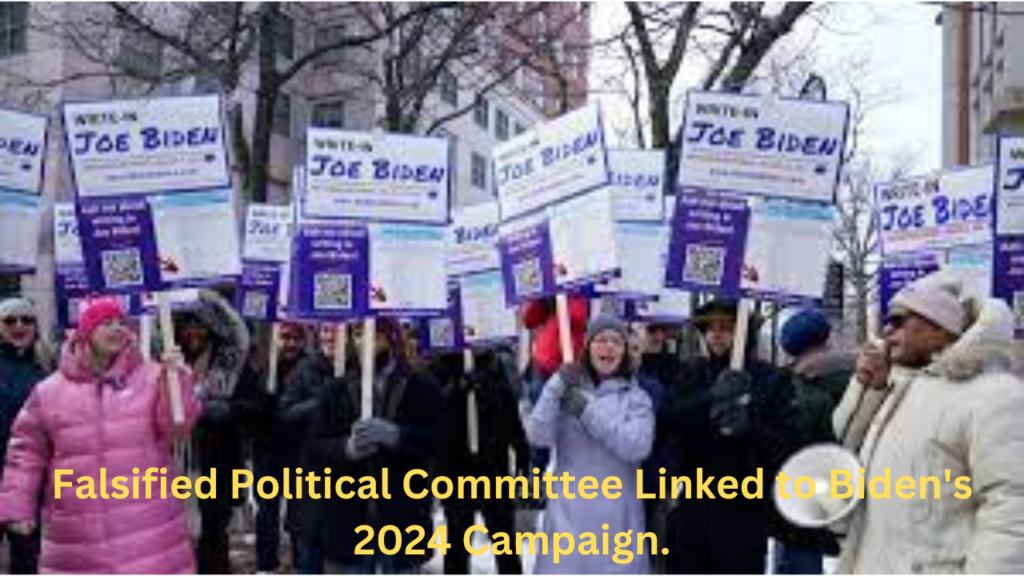AI-Driven Deepfake Robocall :A nefarious political tactic has surfaced, employing artificial intelligence to subvert democracy. This robocall utilizes advanced AI to convincingly mimic President Biden’s voice, discouraging voter participation in the upcoming presidential primary in New Hampshire. This deceptive application of AI voice-cloning technology establishes a concerning precedent and intensifies the demand for regulations governing the responsible deployment of generative AI in order to protect unsuspecting citizens.
Biden Deepfake Robocall Disseminates Misinformation Regarding NH Primary.

In the lead-up to New Hampshire’s crucial Feb. 14 Democratic presidential primary, certain residents have been targeted with robocalls featuring a sophisticated use of AI to deceptively replicate President Biden’s voice. The fabricated message, commencing with Biden’s trademark phrase “What a bunch of malarkey,” falsely advises citizens against voting on Tuesday, asserting the primary’s insignificance for the upcoming November general election. Exploiting common confusion surrounding different election events, the disinformation takes a further deceptive turn, suggesting that voting on Tuesday only benefits Republicans, framing it as a wasted vote that could otherwise aid Democrats later on. The fabricated Biden voice concludes with the claim that “Your vote makes a difference in November, not this Tuesday,” a statement promptly debunked as entirely false by New Hampshire’s Attorney General. The meticulously crafted robocall exhibits genuine vocal inflections and cadences, indicative of AI enhancement, raising concerns about the exploitation of deep learning advancements to undermine the integrity of elections, using the same technology that has been progressively empowering positive innovations.
Voice Cloning Technology Facilitates Flawless AI-Generated Deepfakes.

While previously detectable synthetic voice mimicry used to be clearly automated, recent advancements in generative AI achieve nearly flawless vocal reproductions. Machine learning algorithms employed by services like Respeecher, Murf.ai, and WellSaid Labs leverage extensive datasets of an individual’s previous speeches to master verbal quirks and dialectical nuances crucial for convincing impersonation.
The resulting AI voice clone is capable of producing natural-sounding speech in the target’s voice. However, unlike obvious parody accounts on platforms like TikTok, the audio can be manipulated to say anything the generator chooses, rather than relying on actual statements from the public figure.
These systems are advancing rapidly. Whereas minor glitches once exposed AI fabrications, current versions perform remarkably well in limited testing against human detection. The swift scalability of their capabilities raises concerns, as citizens must confront potential societal hazards with the emergence of more sophisticated tricks outpacing effective defenses.
While voice mimicry finds convenient applications in film, entertainment, and accessibility services, the incident in New Hampshire exemplifies the darker side of its use in the era of social media propaganda. The virtually untraceable robocall, weaponized against voters, serves as an early warning signal that stricter safeguards for generative AI must be implemented promptly.
Falsified Political Committee Linked to Biden's 2024 Campaign.

Exacerbating the situation, the deceptive Biden-voiced robocall conspicuously displayed on caller IDs as originating from the treasurer of Learn More About Donald Trump Inc – a legitimate political action committee (PAC) supporting Biden’s 2024 re-election campaign.
This deceptive tactic, identified as neighborhood spoofing, involves associating scam calls with familiar local numbers to enhance the likelihood of deceiving targets. Robocallers frequently employ spoofed PAC or campaign names when disseminating disinformation, leveraging the recognizable names to further enhance perceived credibility and deceive recipients.
Thus, the AI-powered call not only relies on sophisticated voice cloning but also employs a strategy of concealing the true source entity. The combination of these tactics underscores careful planning aimed at undermining voting rights through information warfare, waged on media platforms still grappling to keep pace with the risks posed by AI.
As technical investigations work towards tracing the origin of the robocall to hold perpetrators accountable, it appears that political tricksters are inevitably poised to exploit generative AI, given the substantial lag in regulations compared to the current threats. The intertwined realms of technology and democracy now face heightened pressure to advance defenses rapidly before irreversible damage occurs.
Write-In Efforts For Biden Occurring Separately From Primary
Ironically, Biden himself won’t even appear on New Hampshire’s primary ballot Tuesday. The vote is meant to gauge current 2024 enthusiasm for announced candidates like Donald Trump, Nikki Haley or Ron DeSantis on the Republican ticket. Joe Biden already secured the Democratic nomination unopposed.
But grassroot activist groups separately launched write-in campaigns for Democratic voters interested supporting Biden’s re-election informally during the primary stage while other candidates compete in the opposing party. These write-in efforts operate distinctly from the formal primary though with no functional impact.
So the deepfake robocall doubly misleads by falsely claiming primary participation impedes anyone’s general election votes when in actuality voting or skipping Tuesday carries zero bearing on November outcomes either way. By deceiving citizens about foundational voting rights, the attack could manage suppressing turnout just enough to damage electoral integrity significantly if left unchecked.
The small scale this example sets still establishes incredibly dangerous precedent on manipulating voters through AI disinformation. If left unrestrained, these tactics risk becoming normalized with technology advancing perpetually while oversight lags behind
What was the number of citizens who received the deepfake robocall?
While the precise number of New Hampshire residents affected by the AI-powered fake Biden robocall remains uncertain initially, the limited scale does not diminish the potential risks if this tactic achieves even marginal success. All forms of election interference that threaten voter rights or ballot security should be universally condemned, regardless of their size or severity.
The restricted reach, however, suggests that the disinformation campaign may have lacked comprehensive funding, distribution resources, or ambitious intentions to significantly influence statewide races on its own. The narrow spread of the deceptive call might have served as a convenient test to gauge how convincingly current voice-cloning AI can deny citizens their voting rights.
In this context, each digitally altered word falsely spoken by the fabricated Biden voice carries the risk of normalizing future deceptive tactics if accountability remains absent. When political strategists observe even the slightest statistical shifts resulting from untraceable AI propaganda, there is an emerging incentive to replicate such tactics exponentially across numerous channels.
For American democracy, which is already grappling with the challenge of preventing social media misinformation from taking root permanently, the insidious spread of AI-generated disinformation introduces a daunting new front with no easy remedies.
Demands for AI Regulations Increase Following the Emergence of Deepfake Robocall.
Consumer advocacy groups sounded alarms in wake of the New Hampshire incident that generative AI remains dangerously unfettered by guardrails to prevent exactly these kinds of malicious scenarios from playing out ubiquitously. They urge lawmakers take urgent actions bringing order to currently unchecked AI systems threatening public well-being.
Organizations like Public Citizen already warned for years that tools like natural language processing pose risks in the wrong hands. But deep learning curves allowing flawless voice mimicry and editing previously recorded speeches to say anything crosses into disturbing new terrain lacking accountability.
The responsibility now falls on legislators to convene technology experts hastening regulatory proposals that balance innovation benefits with societal protections. Companies developing or profiting from AI equally shoulder burdens ensuring customers comprehend limitations before unleashing anarchy.
Because voices provide such profoundly personal identification, listeners often reflexively trust familiar speech without considering potential deception. These biological tendencies leave populations profoundly vulnerable to carefully orchestrated AI disinformation given authenticity gaps fade.
So beyond addressing this single subversive robocall incident, the precedent demands 21st century rethinking around communications regulations that edict acceptable AI conduct especially surrounding elections or public policy matters. Our democratic institutions depend on securing these modernized frameworks soon before generative technologies become too unwieldy to contain.
Balancing Innovation and Regulation: Approaches to Govern Voice-Cloning Systems Without Impeding Progress.
In the fervor for regulatory interventions, it is crucial to recognize the nuances involved in not stifling breakthroughs that could lead to transformative progress in areas such as health, education, employment, and beyond. Implementing judicious guardrails should focus on preventing the misuse of AI for explicit public harm, while allowing for a lighter touch that manages risks and fosters visionary advancements.
Blanket bans rarely yield positive outcomes as technologies evolve globally, especially in the face of increasing complexity. Instead, a careful examination of specific abuses can guide policies toward proportionality. For instance, voice cloning featuring consenting public figures in commercial advertising raises different ethical considerations than identity fraud aimed at suppressing voter rights.
Lawmakers delving into legislation in this cutting-edge field must solicit diverse perspectives to strike a balance between opposing positions. Regional attitudes, influenced by cultural norms, also play a crucial role in shaping how AI oversight ideals are translated across borders. Achieving this delicate balance is challenging, but given the potentially civilization-altering stakes, no options should be off the table during these formative years for the entire trajectory of generative AI.
Embracing reason, compassion, and accountability in equal measure might lead to an emerging AI-powered utopia instead of dystopian outcomes. However, progress cannot be taken for granted. Tough questions must be addressed regarding generative media, democratic elections, mental health impacts, and more, as machines become capable of emulating humanity, for better or worse, in ways never before imagined across the eons of civilizations. Our future remains unwritten.





